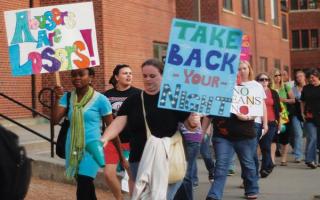Ralliers take a stand against sexual assault
April 22, 2010
Men, women and children gathered on the Memorial Union’s west terrace Thursday night to take a stand against sexual assault.
“All over the world, individuals are joining together to take back the night,” said Ashley Hand, response services coordinator for Assault Care Center Extending Shelter and Support.
Hand went on to talk about Denim Days, which began in Italy in 1992. An 18-year-old girl was picked up by her driving instructor for her lesson. Later, he took her to a secluded area and raped her on the side of the road.
The girl pressed charges, and the instructor was convicted, but, when he appealed to the higher courts, his case was dismissed because she was wearing tight jeans — the argument being the instructor would not have been able to remove them himself.
The women of the Italian Parliament protested by wearing jeans. The tradition continues around the world and here, at Iowa State, today.
Michelle Hendricks, director of the Thielen Student Health Center, was next to the podium.
“We need to prevent the re-victimization of survivors,” Hendricks said.
Hendricks also talked about the fact that most rapes are committed by serial rapists, not “that random guy jumping out of the bush,” a character that is often portrayed in Hollywood films.
“They are premeditated crimes and often happen in social settings,” Hendricks said. “We’re working toward the day when sexual violence is not here anymore.”
Shannon, who did not give her last name, proceeded to tell the story of when she was sexually assaulted on April 12, 2008.
“I was sexually assaulted by my sister’s brother-in-law,” she said. “It was my 21st birthday party and, at 11:30, I went to bed.”
Shannon said she awoke to the most terrifying event in her life, being sexually assaulted by her brother-in-law.
“I was shocked, traumatized and alone,” she said. “I kept wondering what I had done wrong.”
A few months later, in July, the brother-in-law finally agreed to a lie detector test and failed. Shannon received a call at work that he had been charged.
“But on the six-month anniversary of the event, I received a call from my sister, saying she never wanted to talk to me again,” Shannon said.
Shannon was in her room in Buchanan Hall when she was subpoenaed to appear at a deposition. Knowing she would have to sit across from her attacker, she lost all control.
“I woke up in the ICU with a tube being pulled from my throat,” Shannon said. “I had taken several bottles of pills.”
But Shannon’s life turned around when she began a support group to let others know they were not alone in their struggle to recover from sexual assault.
“The only way to move forward is to talk to someone,” she said. “They count on the fact that their victims will be too afraid or embarrassed to say anything.”
Next at the microphone was Tom Hill, vice president of student affairs.
“One victim is too many,” Hill said. “We need to work until there are zero. I wouldn’t want to be that one, and you wouldn’t want to be that one. We need to not reduce, but eliminate.”
Finally, Andrew Patz, senior in mechanical engineering and recipient of the 2010 Story County Youth Volunteer Award, stood to speak.
“Prevention is key,” Patz said. “Wouldn’t it be great if there were a superhero to watch over us all?”
Patz stressed that persistence and understanding is necessary to help prevent sexual violence.
The group congregated on the terrace and, along with ISU Groove, a spring percussion club, began to march from the Memorial Union, down Lincoln Way, through the Friley arches and through Central Campus, to LeBaron Hall.
Group members shouted chants, such as “Survivors unite. Take back the night!” and “Join together. Free our lives. We will not be victimized!”
The night ended in LeBaron Hall, where Scheherazade Tillet and her sister, Salamishah Tillet, presented “The Audacity to Heal,” which describes Scheherazade’s use of photography and art therapy to help her sister recover from her sexual assault.
“One in four women is sexually assaulted in their lifetime, and one in six men are sexually assaulted in their lifetime,” Salamishah said. “It is an epidemic.”
The sisters then presented a multimedia show, titled “Story of a Rape Survivor,” or SOARS. Salamishah told her story of her three experiences with sexual assault in her life, the first as a young child, the second as a freshman in college and the third on a study abroad program her junior year of college.
The show goes on to tell of her progress coping with and recovering from the sexual assaults to become the woman she is today.
“How does one heal from this?” Scheherazade said. “When Salamishah first told me two years after the fact, I didn’t know how to respond. I stood with that silence for about a year.”
Scheherazade went on to create this project for a photography class, and the project grew until it was her senior project, which was presented to the entire university.
“I wanted to show how amazing and courageous it was of her, putting the pieces back together,” Scheherazade said.

















